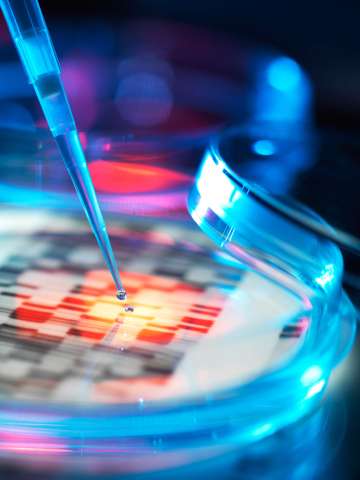Genetic Heart Disease
Our experts specialize in personalized testing, treatment and genetic counseling for people with known or suspected genetic heart diseases. We aim to make early diagnoses to improve your chances of living a full and healthy life with heart disease.

Why choose UCLA Health for genetic heart disease care?
The UCLA Health Cardiovascular Genetics Clinic provides an interdisciplinary approach, combining expertise in both genetics and cardiology. Our clinic offers individualized cardiac care to patients and families diagnosed with inherited cardiovascular conditions.
Clinical evaluations include:
Comprehensive assessment: Our team will review your medical history and collect a thorough family history. This comprehensive assessment guides ordering and interpreting your genetic testing. We may also recommend other clinical evaluations or therapies.
Family screening: We assess the likelihood of a genetic contribution to cardiovascular disease and make screening recommendations for family members we suspect may be at increased risk. If we identify a genetic cause for your heart disease, we will provide additional guidance and facilitate testing for family members.
Advancing care through research: We believe that research is foundational to improving and advancing cardiovascular genetics care. Our physicians collaborate with the broader research community and share opportunities to be involved in trials or registries.
What are genetic heart conditions?
Genetic or inherited heart diseases are caused by a spelling change in our genetic material. While these spelling changes are present at birth, heart abnormalities caused by these changes can arise at any age. If you or a family member has a known or suspected genetic cardiovascular condition, you may benefit from genetic counseling to clarify the diagnosis and to see if family members may be at risk.
We provide genetic counseling as well as cardiac evaluation for a wide range of conditions, including:
Cardiomyopathies
Cardiomyopathies are diseases of the heart muscle that make it difficult for the heart to pump blood throughout the body. This can lead to symptoms of shortness of breath, swelling or heart rhythm problems. Some people may be very mildly affected or have no symptoms at all. Some types of cardiomyopathies have a genetic component, including:
Dilated cardiomyopathy: Patients may be initially diagnosed with “viral” or “idiopathic” cardiomyopathy until additional investigation reveals a genetic component.
Arrhythmogenic cardiomyopathy: In addition to symptoms of a weak heart muscle, scarring in the heart muscle can lead to the development of dangerous heart rhythms.
Hypertrophic cardiomyopathy: Hypertrophic cardiomyopathy is caused by overgrowth of heart muscle cells. Some individuals may have no symptoms at all.
Cardiac amyloidosis: A progressive condition caused by a buildup of abnormal protein in the heart called amyloid. Most cases of cardiac amyloidosis are due to aging, but a subset can be caused by genetic changes.
Aortopathies
These diseases affect the aorta, the largest artery in the body that carries blood away from the heart. Individuals may have aneurysms or abnormal widening of the blood vessel leading to a tear in the lining of the artery called a dissection, a medical emergency. It is normal for the aorta to get bigger as we age, but a genetic cause may be suspected if the size of the aorta is larger than expected, it occurs in younger individuals, or if someone has a family history of aortic disease.
Lipid disorders
Cholesterol levels can be affected by lifestyle factors but very high levels (greater than 190 mg/dl) of LDL, or “bad cholesterol,” are usually driven by genetic factors. Having very high LDL cholesterol levels from early childhood can cause early onset heart disease.
Arrhythmias
These genetic disorders are caused by genetic changes that affect a type of protein called ion channels, which control the heart rhythm. Channelopathies that affect the heart often cause arrhythmias, or irregular heart rhythms. Types of channelopathies include:
Atrial fibrillation: An arrhythmia occurring in the upper chambers of the heart that can increase the risk of stroke and heart failure. While atrial fibrillation is very common in older individuals, early onset atrial fibrillation may be associated with a genetic predisposition.
Long QT syndrome: Long QT syndrome affects the time it takes the heart to recharge between beats and may cause rapid and chaotic heartbeats. Avoiding certain medications is very important to prevent dangerous heart rhythms.
Brugada syndrome: A rare, potentially life-threatening condition that causes a dangerously fast heartbeat.
Other reasons for a genetic cardiology evaluation include:
Sudden death in the family: In younger individuals, a sudden unexplained death could be the first sign of a previously undiagnosed genetic heart condition, such as an inherited arrhythmia or cardiomyopathy.
Congenital heart defects: the genetic factors contributing to congenital heart disease are not very well understood at this time. This means we currently do not have effective genetic tests for most of these conditions. Genetic testing can be helpful in cases where a person has other health problems, such as other birth defects, developmental delay, or learning problems. Genetic counseling can help estimate recurrence risk for family members and evaluate if testing is appropriate.
For questions or to schedule an appointment, please call 310-825-8816 and ask to speak with the cardiogenetic schedulers.
Meet our team
Our cardiovascular genetics team provides targeted, personalized care for patients with inherited cardiovascular diseases. We offer genetic counseling and support for your entire family. Our physicians are clinical leaders and active researchers advancing the field of cardiovascular genetics.



Contact us
For questions or to schedule an appointment, please call 310-825-8816 and ask to speak with the cardiogenetic schedulers.
Find your care
Our team provides treatment and counseling for your whole family. Call 310-825-8816 to learn more about the Cardiovascular Genetics Clinic.



